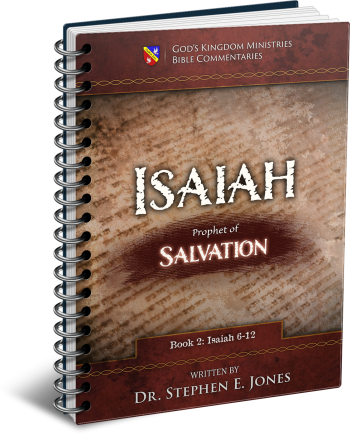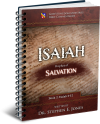Latest Posts
View the latest posts in an easy-to-read list format, with filtering options.

Isaiah is the prophet of Salvation. He is also known as the truly "Universalist" prophet, by which is meant that He makes it clear that salvation is extended equally to all nations and not just to Israel. He lived to see the fall of Israel and the deportation of the Israelites to Assyria, and he prophesied of their "return" to God (through repentance). He is truly a "major prophet" whose prophecies greatly influenced the Apostle Paul in the New Testament.
Category - Bible Commentaries

Israel and even Judah had treated God’s warning (the great earthquake) as if it were just another natural disaster that could be overcome. By not recognizing or hearing God’s “message,” the people did not repent of their lawless ways but continued marching confidently toward the destruction of the nation.
Therefore, the prophet told them plainly the consequences of their actions. Isaiah 9:14, 15, 16 says,
14 So the Lord cuts off head and tail from Israel, both palm branch and bulrush in a single day. 15 The head is the elder and honorable [paniym] man, and the prophet who teaches falsehood is the tail. 16 For those who guide this people are leading them astray; and those who are guided by them are brought to confusion [behlah, “devoured”].
The prophet uses two metaphors here to describe the men of Judah and Israel. The first is “head and tail,” which is then further described as “palm branch and bulrush.” The “head” is seen as a “palm branch,” and the “tail” is a “bulrush.”
The two plants have obvious differences. Palm trees were biblical symbols of authority and were also used to build booths at the feast of Tabernacles (Lev. 23:40). This is suggested also by the prophet’s use of the term paniym (“face, presence”). The NASB renders it “honorable,” because paniym also means “before, front, at the head of,” as seen, for example, in Ezekiel 2:10.
A bulrush (agmown) was a reed in a marsh or pool of warm, standing water. The root word means “to collect water.” The metaphor referred to the stagnant or corrupt water. Because these reeds also bow low in the wind, they were also viewed as lowly. Hence, Isaiah compares the lowly bulrush to the “tail” and to “the prophet who teaches falsehood.”
So Isaiah tells us that the nation (both the good and bad people alike) was to be judged. However, we must modify this somewhat by the revelation of the remnant, for they are the “surviving remnant” (Isaiah 37:31). Actually, they are more than just survivors; they are the overcoming remnant. (The Hebrew text just calls them the remnant.)
Likewise, Ezekiel 9:4-6 makes it clear that those who were specially marked by God’s signature (tav, “sign, signature, mark”) in their foreheads were to be spared in the destruction of Jerusalem. The tav was originally written as a cross or X. It is God’s signature.
Nonetheless, the judgment on the nation was to affect everyone in the nation, and both good and bad were to be killed. God certainly deals with people as individuals, but He also deals with nations as collective units. Not all good people are marked by God’s signature.
For unmarked good people to be spared, they would be wise to leave the danger zone, as did the Christians in the Jerusalem church in the first century. The Roman siege of Jerusalem had been foretold by Jesus forty years in advance, and so when the Christians saw the danger, they moved out of the city to the safety of Pella, a town on the east side of the Jordan River.
“Furthermore, the members of the Jerusalem church, by means of an oracle given by revelation to acceptable persons there, were ordered to leave the City before the war began and settle in a town in Peraea called Pella” (Eusebius, Ecclesiastical History, III, 5).
Hence some are protected by taking heed of the divine warnings; others are protected in the midst of judgment. Each must discern and determine the will of God for himself. The key is not to be guided by “the prophet who teaches falsehood” (Isaiah 9:15), for if such people live in the appointed time of divine judgment, they will be devoured by the all-consuming fire of God.
Isaiah 9:17 says,
17 Therefore the Lord does not take pleasure in their young men, nor does He have pity on their orphans or their widows; for every one of them is godless and an evildoer, and every mouth is speaking foolishness. In spite of all this, His anger does not turn away and His hand is still stretched out [in judgment].
While it may seem unjust for God to judge young men, orphans, and widows, “every one of them is godless and an evildoer.” They cannot use their age or status as an excuse, for the word of God was available to them through the prophets among them. They testified against themselves by “speaking foolishness,” rather than the word of God.
The final sentence in verse 17 above is incorrectly rendered in the NASB, giving the impression that in spite of all their godless and foolish talk, God’s judgment was not turned aside. That makes no sense.
The words “spite of” in italics were added by the translator. I do not know what he was thinking. Someone must have had a senior moment and began “speaking foolishness.”
It should read, “In all this,” that is, in all of their godless and foolish talk, “his anger does not turn away and His hand is still stretched out” to judge them.
Isaiah 9:18, 19 continues the thought,
18 For wickedness burns like a fire; it consumes briars and thorns; it even sets the thickets of the forest aflame and they roll upward in a column of smoke. 19 By the fury of the Lord of hosts the land is burned up, and the people are like fuel for the fire; no man spares his brother.
Fire is indiscriminate. It burns “briars and thorns,” which men may approve, because these represent criminals and idolatrous foreigners who pollute the land and corrupt society. But the same fire can also become a forest fire that is not welcome. When judgment comes upon the nation as a whole, “the land is burned up, and the people are like fuel for the fire.” This is the forest fire.
The law cannot justify sinners; it can only demand payment to bring about justice. Mercy and grace is extended only when the proper appeal is made through Jesus Christ. The law made provision for grace through its sacrificial system that pointed to Christ, but liability for sin remained until that appeal was made in a lawful manner. There are many good people who live in a lawless nation and who assume that because they are good, they will avoid judgment when the nation is judged.
That is not so. “All have sinned” (Rom. 3:23), and the whole world is thus “accountable to God” (Rom. 3:19). The law holds them accountable unless it sees the blood of Jesus applied to their sin. This is depicted in the feast of Passover, where the blood of the lamb, representing Christ, was applied to the house. Those under its roof were thus covered. No doubt many good Egyptians did not believe the word that was spoken, so when they remained outside of the covering of the blood, they paid the price.
Christ is the Savior of all men (1 Tim. 4:10), but only because God will see to it that all eventually have faith in Christ and come under His blood covering. Theoretically, if any man should remain outside of that blood covering, he would remain lost. But the New Covenant oath of God to make us His people and to be our God guarantees that He will continue His work until all men have faith in the blood of Jesus.
See my book, The Restoration of All Things.
Isaiah 9:20, 21 says,
20 They slice off what is on the right hand but still are hungry, and they eat what is on the left hand but they are not satisfied. 21 Manasseh devours Ephraim, and Ephraim Manasseh, and together they are against Judah. In spite of all this, His anger does not turn away and His hand is still stretched out.
Once again, the NASB translators had a senior moment by adding “spite of” to the original text. They make it sound like in spite of all of this fighting and disunity among Manasseh, Ephraim, and Judah, God was still going to continue judging them! That is not what Isaiah was saying. The prophet was telling them that because of their actions, God’s hand was still stretched out in judgment against them.
The prophet says that Ephraim and Manasseh were devouring each other as if a man were eating his own left or right hand. Senseless wars and conflicts come from the carnal mind that seeks its own interests and its own advantage over others. The carnal mind seeks to dominate and devour others, rather than to serve others.
The prophet’s terminology was taken from the law of tribulation in Lev. 26:26, “you will eat and not be satisfied,” and from Lev. 26:29, “you will eat the flesh of your sons and the flesh of your daughters.” It was the calling of prophets to interpret and apply the law, often in ways not clearly understood in the law itself. In this case, Isaiah tells us that Manasseh’s attempts to devour Ephraim, and vice versa, were fulfilling the law of tribulation.
To devour one’s brother (or fellow tribe) could never satisfy the desire of the carnal mind, for the flesh is never satisfied. So it was said that Alexander the Great wept because he had no more worlds to conquer.
Hence, God condemns the carnal mind and its ambitions as the cause of suffering in the world. This is why God holds nations accountable.